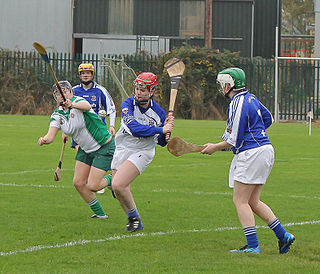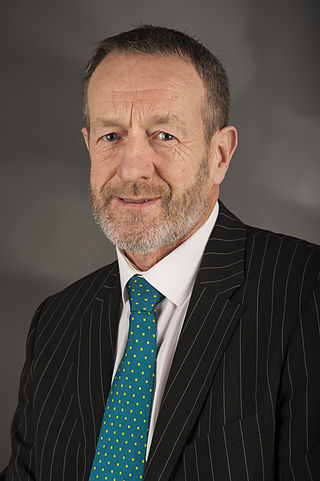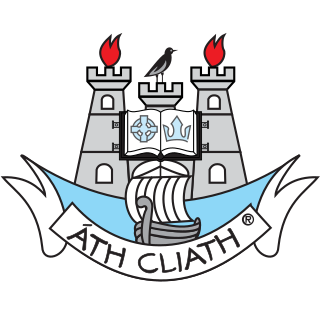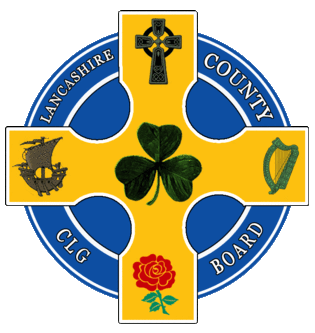Related Research Articles

Gaelic football, commonly known as simply Gaelic, GAA or Football is an Irish team sport. A form of football, it is played between two teams of 15 players on a rectangular grass pitch. The objective of the sport is to score by kicking or punching the ball into the other team's goal or between two upright posts above the goal and over a crossbar 2.5 metres above the ground.

Camogie is an Irish stick-and-ball team sport played by women. Camogie is played by 100,000 women in Ireland and worldwide, largely among Irish communities.

The Gaelic Athletic Association is an Irish international amateur sporting and cultural organisation, focused primarily on promoting indigenous Gaelic games and pastimes, which include the traditional Irish sports of hurling, camogie, Gaelic football, Gaelic handball and rounders. The association also promotes Irish music and dance, as well as the Irish language and it also promotes environmental stewardship through its Green Clubs initiative.

Kilmacud Crokes is a large Gaelic Athletic Association club located in Stillorgan, Dublin, Republic of Ireland.

Seán Kelly is an Irish politician who has been a Member of the European Parliament (MEP) from Ireland for the South constituency since July 2009. He is a member of Fine Gael, part of the European People's Party.

The Dublin County Board of the Gaelic Athletic Association (GAA) or Dublin GAA is one of the 32 county boards of the GAA in Ireland, and is responsible for Gaelic games in County Dublin and the Dublin county teams. The teams and their fans are known as "The Dubs" or "Boys in Blue". The fans have a special affiliation with the Hill 16 end of Croke Park.

The Derry County Board of the Gaelic Athletic Association (GAA) or Derry GAA is one of the 32 county boards of the GAA in Ireland. It is responsible for Gaelic games in County Londonderry in Northern Ireland. The county board is also responsible for the Derry county teams.

The Tipperary County Board of the Gaelic Athletic Association (GAA) or Tipperary GAA is one of the 32 county boards of the GAA in Ireland, and is responsible for Gaelic games in County Tipperary and the Tipperary county teams.

The Louth County Board of the Gaelic Athletic Association (GAA) or Louth GAA is one of the 32 county boards of the GAA in Ireland, and is responsible for Gaelic games in County Louth. The county board is also responsible for the Louth county teams.

The GAA Interprovincial Championship or Railway Cup is the name of two annual Gaelic football and hurling competitions held between the provinces of Ireland. The Connacht, Leinster, Munster and Ulster GAA teams are composed of the best players from the counties in each province. The games are organised by the Gaelic Athletic Association.
The All-Ireland Senior Club Football Championship is an annual Gaelic football tournament which began in season 1970–71. It is the top-tier competition for the senior football clubs of Ireland and London.
The Leinster Senior Football Championship, known simply as the Leinster Championship and shortened to Leinster SFC, is an annual inter-county Gaelic football competition organised by the Leinster Council of the Gaelic Athletic Association (GAA). It is the highest inter-county Gaelic football competition in the province of Leinster, and has been contested every year since the 1888 championship.

The county colours of an Irish county are the colours of the kit worn by that county's representative team in the inter-county competitions of the Gaelic Athletic Association (GAA), the most important of which are the All-Ireland Senior Football Championship and the All-Ireland Senior Hurling Championship. Fans attending matches often wear replica jerseys, and wave flags and banners in the county colours. In the build-up to a major match, flags and bunting are flown or hung from cars, buildings, telegraph poles, and other fixtures across the county, especially in those regions where GAA support is strong.
A county is a geographic region within Gaelic games, controlled by a county board of the Gaelic Athletic Association (GAA) and originally based on the 32 counties of Ireland as they were in 1884. While the administrative geography of Ireland has since changed, with several new counties created and the six that make up Northern Ireland superseded by 11 local government districts, the counties in Gaelic games have remained largely unchanged.

The Lancashire County Board of the Gaelic Athletic Association (GAA), or Lancashire GAA, is one of the county boards outside Ireland and is responsible for the running of Gaelic games in the North West of England and on the Isle of Man. With Scotland, Warwickshire, Gloucestershire, Hertfordshire, London and Yorkshire, the board makes up the British Provincial Board. The Lancashire board oversees the Lancashire Junior Championship, the Lancashire Junior League, and the first and second division of the Pennine League.
The following is an alphabetical list of terms and jargon used in relation to Gaelic games. See also list of Irish county nicknames, and these are very interesting.
Christy Cooney is a Gaelic games administrator, who served as the 36th president of the Gaelic Athletic Association. He was elected president at the annual GAA Congress on 12 April 2008 and succeeded Nickey Brennan in the post in 2009 - becoming the 36th president of the GAA.
Rule 42 is a rule of the Gaelic Athletic Association (GAA) which in practice prohibits the playing of non-Gaelic games in GAA stadiums. The rule is often mistakenly believed to prohibit foreign sports at GAA owned stadiums. However, non-Gaelic games such as boxing and American football did take place in Croke Park before Rule 42 was modified.
The GAA Congress is the supreme legislative body of the Gaelic Athletic Association, commonly known by its acronymic, the GAA. The GAA is the international governing body of Gaelic games such as football and hurling. The congress may be annual or special.
Combined Universities GAA was a Gaelic football and hurling team that was made up of players from the major universities of Ireland. The players were taken from St Patrick's College, Maynooth, Queen's University Belfast, Trinity College Dublin, University College Cork, University College Dublin, University of Ulster at Jordanstown, and University College Galway. In the 1980s Combined Advanced Colleges GAA joined in to make the annual contests between Combined Universities, Army and Garda a quadrangular tournament.
References
- ↑ "1.9 Units/Jurisdiction. The Association is a democratic organisation comprising the following units: (a) Clubs (b) County Committees (c) Provincial Councils (d) Central Council (e) Annual CongressOfficial Guide 2008" (PDF). Archived from the original (PDF) on 20 February 2011. Retrieved 23 September 2009.
- ↑ "Reaching out beyond the pitch - "For that is what the GAA continues to be, a garrulous and driven social phenomenon. The club is the basic unit. "". Irish Times. 18 April 2009. Retrieved 24 September 2009.
- ↑ "Divisional conventions have their say - "Stating that the Club must remain the basic unit of the Association, the loyalty of club members must be of paramount importance, the Secretary also asks the members of the various county teams to equally play their in the promotion of the aims and ideals of the G.A.A."". Munster Express. 7 December 2007. Retrieved 24 September 2009.
- ↑ "Ladies crowned league champions - "The club is the basic unit of the GAA. It is to the Association what the family is to society."". Roscommon Herald. 13 May 2009. Retrieved 24 September 2009.